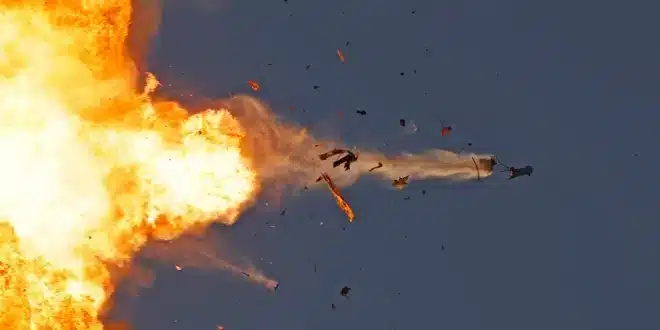The Israeli military initiated what it described as “preemptive” strikes against Hezbollah in Lebanon, following the Iran-backed group’s own attacks in response to the killing of a high-ranking commander.
The Israel Defense Forces (IDF) announced that around 100 of its fighter jets “struck and destroyed thousands of Hezbollah rocket launcher barrels” at numerous launch sites across Lebanon on Sunday. These strikes were followed by additional attacks later in the day.
Israel stated that the strikes were carried out after detecting that Hezbollah was “preparing to fire missiles and rockets toward Israeli territory.”
Shortly after the Israeli raids, the IDF reported that approximately 200 rockets had been launched from Lebanon towards Israel on Sunday morning, with no immediate reports of injuries. Hezbollah claimed the “first phase” of its strikes against Israel had concluded “with complete success,” stating that it had launched 320 rockets and a number of drones toward Israel.
The Lebanese Ministry of Health reported that two people were killed in Israeli strikes on the village of At Tiri in Nabatiyeh, southern Lebanon, and a third person died when a car was struck in the town of Khiyam.
The Amal movement, a Shia group allied with Hezbollah, announced that one of its fighters, Ayman Kamel Idriss, was killed in Al-Khiyam “while performing his national and jihad duty in defense of Lebanon and the South.”
Hezbollah said its strikes on Israel were in retaliation for the killing of their top military commander, Fu’ad Shukr, last month in the southern suburbs of Beirut, an area heavily populated and considered a stronghold of the Iran-backed group.
The ongoing exchanges of fire between the Israeli military and Hezbollah have increased concerns about a wider regional conflict, leading to intense diplomatic efforts to reduce tensions.
Israel’s latest strike on Hezbollah targets in Lebanon followed a statement from its military on Saturday, indicating that it was prepared for any potential retaliatory attacks by Hezbollah or Iran for the deaths of its senior leaders.
Israeli Defense Minister Yoav Gallant has declared a “special situation on the home front” nationwide, granting the Israeli military authority to issue directives to the public, such as limiting gatherings and closing certain sites.
Gallant has also informed US Secretary of Defense Lloyd Austin about the Israeli strikes in Lebanon.
US President Joe Biden is closely monitoring the developments in Israel and Lebanon, according to the White House on Saturday night.
Biden “has been engaged with his national security team throughout the evening. At his direction, senior US officials have been in continuous communication with their Israeli counterparts. We will continue to support Israel’s right to defend itself and work towards regional stability,” stated National Security Council spokesperson Sean Savett.
Rocket attacks on Israel by Hezbollah militants from southern Lebanon have become almost a daily occurrence since the conflict in Gaza began, with an increasing number of skirmishes.
On Friday, Hezbollah claimed responsibility for 15 strikes against Israel and acknowledged the death of seven of its fighters, although it did not specify where or when they were killed. The IDF reported that a total of 110 projectiles were fired from Lebanon towards Israel on Friday, marking one of the most intense days of cross-border fire in recent weeks.
Meanwhile, flights resumed at Tel Aviv airport after being temporarily halted for less than two hours on Sunday.
The ongoing clashes between Israel and Hezbollah coincide with ongoing negotiations for a ceasefire and a hostage deal in Israel’s war against Hamas in Gaza.
Despite Sunday’s strikes, an Israeli delegation is still expected to travel to Cairo for negotiations scheduled to resume on Sunday, according to an Israeli official who spoke with CNN.
Senior negotiators are anticipated to address remaining issues concerning a potential three-phase agreement.


